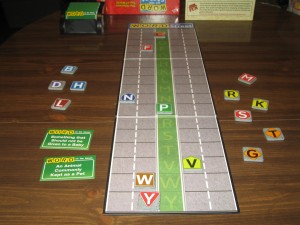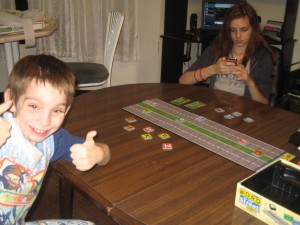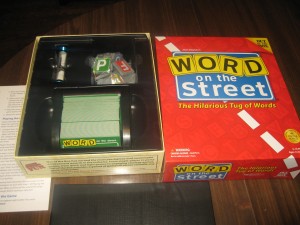It’s only fitting that I follow up my last article, “Real Parenting: The Power Of Knowledge“, with a review on the latest board game I’ve had the pleasure of playing with the youngest members of the family. It’s quite possibly one of the most educational board games in my collection which makes me excited to play it…especially with my eleven year old son who, at one point, had to take speech classes. It’s a board game that forces players to not only come up with words that fit a category, but makes them spell it correctly too.
*Note – I honestly think that this can be played by those that are ages 7 and up*
Word on the Street isn’t limited to two players, even though there are only one of two sides players can be on. Players can pair up into teams and decide on words together when it is their turn.
The board is set up by placing all of the letters on the middle track. In this version, vowels and a choice few consonants are missing from the game…more on that in a minute.
The object of the game is for your side to capture five letters. The first player / team to do so wins. How do you capture letters? When it is one side’s turn, they draw a card. Using the parameters on that card, they must come up with a word and spell it, moving each letter on the board one space toward their side. If the word fits the category and that side spells it correctly, the letters stay as is. The other team can challenge the word should they wish with varying consequences for either side, depending on who is right.
Throughout the game, players / teams will be spelling words and moving letters in a tug-of-war fashion back and forth until one letter goes off the board on either side…resulting in said letter being captured.
As an example…Team A draws a card and it says…”A red fruit.” Team A then comes up with the best, longest word they can using the letters in play. Any letters not on the board are skipped. As I mentioned earlier, the game leaves out vowels and a few constonants…you’d simply skip those letters and move on to the next one. In this example, Team A decides on “Apple.” They spell it out while moving the letters one space closer to them. There is no “A” or “E” on the board, so Team A will be moving the letter “P” two spaces toward them and “L” one space towards them. They still have to spell the word out completely proving that they know how to spell it.

Overview: Letters start off in the middle and work their way back and forth to either side as words are spelled. Letters that go off the board are captured by that side and remain out of play. If someone ends up using a letter not in play, that letter is simply skipped when moving the tiles.
To top that off, the game includes a timer that forces players to pick a word and spell it before time is up. This is to prevent players from taking a half hour to come up with a long, regulation word that would severely crush the other side. In my first game, however, I chose not to include it. I was more interested in making my son think of a good word than him being rushed and come up with a bad one. If he starts getting good and really quick…I might have to include it.
That’s all there is to it. Players / Teams go back and forth, finding the best word based on the letters available. If some letters are captured already, players / teams might opt to pick words that don’t have a lot of those letters in it…just so that they aren’t wasting their turn.
I personally love this game…not because I find the gameplay and strategy to be deep (it really isn’t that deep), but because it provides me with a way of quizzing my son on his spelling and vocabulary while spending quality time with him. I also enjoy the flexibility of being able to play how I want based on who is playing. No timer…pfffft…whatever. Kids versus me…pffft…no problem. Timer for me but not for the kids as a handicap…pfffft…sure. One free “phone-a-friend” from the person watching television who doesn’t feel like playing but doesn’t mind being bugged…pffft…why not? Seriously…I didn’t even bother reading the rulebook for longer than a minute. It goes on about regulation words and the like…but it’s my game and I’ll play it how I want depending on who’s all playing.
This game would be great for classrooms, in my honest opinion. It’s like Scrabble, but a lighter version with a twist.

I asked for a thumbs up or a thumbs down…I guess Facebook is just more interesting for some people. I seriously think she needs an intervention.
I asked my son about what he thought about the game and his final verdict was that he really liked the game. He said he enjoyed trying to come up with the best word for the category he was presented with. The best word, obviously, is a word that uses a lot of consonants in play…preferably a word that moves multiple letters away from my side of the board. The thirteen year old was active and engaged during the game, bouncing words off of the eleven year old as they were on the same team. While she jokes often that she only likes the games she wins at, I could tell that she enjoyed playing a word game that challenged her mind a little. I highly recommend the game, whether it is for family fun night or for educational purposes.
Final Verdict: 9/10
—

